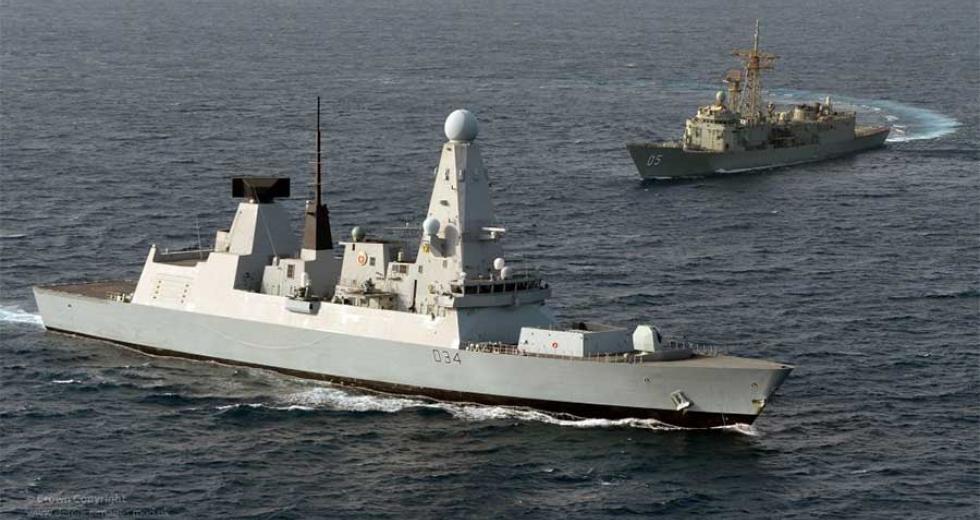
The Sunday Times has "revealed the huge gaps in UK defences". As a retired Royal Navy officer, I have my doubts about the reasons for these gaps which the former First Sea Lord, Admiral Sir Mark Stanhope, offers in the article.
The new Type 45 destroyers, which famously were not designed to operate in warm waters, are revealed by this article to be audible a hundred miles away and to sound "like a box of spanners". The explanation which Sir Mark proffers for this is:
You design noise quietening into warships that are designed to detect and track submarines. We never designed the Type 45 to be a quiet warship.
This is utter nonsense, uncritically reprinted by the Sunday Times. Noise-quietening is a well established Royal Navy technique and most of what goes into it is easy to do. It is cheap; there is no big technology involved.
In 2010, granting an interview to the Royal Navy's internal channel Two Six TV in the wake of the Strategic Defence and Security Review, Sir Mark, as the then serving First Sea Lord, addressed (at 4:30) the carrier problems which the SDSR had caused. Having said that the decisions on the carriers were "the one incoherence" in the SDSR which he had unsuccessfully "fought hard against", he added:
In the end, it was a decision made—collectively—that it would be the Tornado that we keep [and not the Harrier]. [At this point, there is an obvious edit cutting out some of Sir Mark's remarks.]
That leaves, therefore, me, and the Royal Air Force, and defence as a whole, with a challenge of not transferring the capability of carrier strike from our current aircraft carriers to our new ones, but there's a gap. We've got to make sure that we can pull through some expertise to feed the growth path to be able to deliver strike aircraft off our new Queen Elizabeth-class aircraft carriers in the future.
This is meaningless Newspeak. What he means is that we have had to go grovelling to the French for the expertise we have scrapped.
Sir Mark went on in that 2010 interview to recount how the news of what was going to be scrapped under the SDSR was leaked to the press and "spun disgracefully", and we see him visibly trembling as he talks about it. Even here, there is Newspeak: he apologises "not because we got it wrong, but because the system got it wrong." Who is this 'system' which even the First Sea Lord is afraid of identifying?
He finished the interview by forecasting "quite an exciting future" for the Royal Navy, as it goes "projecting UK influence around the world and interjecting where we need to". Listening to this interview and watching the then Navy head's mannerisms, I have to conclude that something is badly wrong with our senior officers.
David Ellis' recent paper traces what Sir Mark did in the wake of the SDSR 2010:
Looking elsewhere, we find that other evidence of collaboration has broken surface. Navy News casually reported that the First Sea Lord, Admiral Mark Stanhope, had "fought hard for his service, as details of the [recent] Strategic Defence Review were thrashed out."
It was, therefore, surprising to discover - on the same page - that following the Treaty, Mr Stanhope had been collaborating in a meeting with French naval counterparts to develop joint British-French military doctrine, shared training, equipment and technology, and a common supply chain.
It was also accurately reported that Stanhope's collaboration was conducted wearing civilian lounge suits rather than in uniform.
Should Sir Mark not have been concentrating more and speaking more publicly on what was happening to the British military, instead of thrashing out closed-door deals with the Royal Navy's historic greatest rival?
It is only the UK Column which has been reporting for six years on the trail of treason by David Cameron's government going back to October 2009, a treason presided over by a "charity", the Franco-British Council.
If we take a look at who was deciding the future of the British military in closed session in 2010, we see a number of French and other foreign or foreign-born politicians, and a large dollop of involvement by another "charity", the Royal United Services Institute. No minutes of these deliberations have ever been published.
Returning to the recent Sunday Times article, we see that one of the RUSI men quoted is John Louth, who, as RUSI's website tells us,
has also worked as a senior adviser to the European Defence Agency on the development of pan-European procurement policies and practices.
Does the interest of such a figure in spinning the reasons for Britain's declining naval prowess not vindicate David Ellis' recent string of reports on the push to destroy Britain's ability to procure its own defence equipment? This is the last step of implementation of the banking establishment's seven-decade policy of European Union military union and defence-industry union backed by a single EU treasury.
Another RUSI man mentioned in the article, Michael Clarke, is ex-Chatham House, chaired RUSI's "Independent" Surveillance Review justifying the new encroachments of the intelligence services on the domestic population, and
also served on the Strategic Advisory Panel on Defence for UK Trade and Industry and in 2014 was Chairman of the Defence Communications Advisory panel for the Ministry of Defence.
Who appointed these men to rethink the British military? Can their explanations of the military's evident problems be trusted? I am not convinced by the explanations offered by any of these great and good.
Main image: Defence Images (CC BY-SA 2.0)

